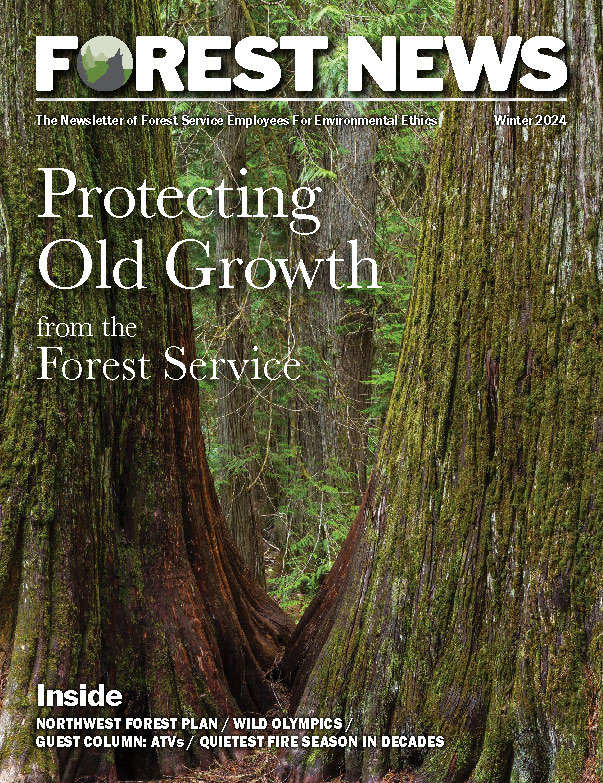I’m camped outside Peter DeFazio’s office — it opens at 9 a.m. — going over my testimony for today’s hearing. Read it belo.
— Andy Stahl.
Congressional testimony of Andy Stahl, Executive Director, Forest Service Employees for Environmental Ethics
Thank you, Mr. Chairman. My name is Andy Stahl, I am the Executive Director of Forest Service Employees for Environmental Ethics, a 10,000 member coalition of civil servants who manage our national forests, combined with the citizens who own them. I want to thank you for holding this hearing on H.R. 2888, a bill to designate the Devil’s Staircase Wilderness and to protect segments of Wasson and Franklin Creeks as wild or recreation rivers.
I especially want to thank Representatives Blumenauer, Schrader and Wu for cosponsoring the bill, and Senators Wyden and Merkley for introducing its companion, S-1272, in the Senate. On behalf of all of my fellow Oregonians who care about our state’s wildest places, I want to give a special thanks to Representative DeFazio. I had the pleasure, with Peter, of making a descent into the rarely visited Devil’s Staircase last fall.
It was an eight-hour bushwack through Oregon’s steepest, most remote geography. We were fortunately led by two Forest Service scientists who knew the area better than we did. We traveled through 300 year old forests, thickets of impenetrable Vine Maple, and Evergreen Huckleberry and Devil’s Club, and we, with no small amount of luck, actually made it to the staircase itself.
Only the second time in my life I had ever been there, it was an epic trip and it demonstrated just what a wilderness area is really like when it is wild. In 1983, Oregon Senator Mark Hatfield first brought attention to this wild place. He held field hearings on H.R. 1149 which became the 1984 Oregon Wilderness bill, and he heard testimony in support of Devil’s Staircase, then called Wasson Creek, from a number of Oregon citizen groups and Oregonians.
By 1984, the Devil’s Staircase area lay at the heart of a forest policy crisis over logging related landslides in Oregon’s coast range. A Federal District Judge had ruled that, ‘‘The steep slopes make the Mapleton District particularly susceptible to soil erosion. It has the highest concentration of landslide prone land types in the Siuslaw National Forest.’’
The Judge went on to explain that as early as 1963 Forest Service personnel noticed that timber harvesting damaged soil, watershed and fish habitats in the district, and throughout the 1960s soil specialists warned that logging and road construction could se- riously affect soil and watershed stability.
In 1969 the regional forester placed a moratorium on timber harvesting in the part of the Mapleton District between the Smith and Umpqua Rivers. That is precisely the area proposed for protection in this bill. In 1995, after a 10 year planning process, the Bureau of Land Management designated its portion of Devil’s Staircase as an area of critical environmental concern making it unavailable for timber harvest.
As part of the Northwest Forest Plan, the Forest Service designated its lands as a late successional forest reserve. The area is also critical habitat for both the Northern Spotted Owl and Mar- bled Murrelet protected under the Endangered Species Act. Today, Devil’s Staircase remains Oregon’s most wild, most remote and most unexplored corner. Its deeply canopied forests, some of whose trees are hundreds of years old, is the least fragmented in Oregon’s coast range.
It has wildlife, like the aforementioned Pacific Giant Salamander we heard in the hearing today. Also has a wonderful little lake, Wasson Lake, created by a recent landslide to which people picnic and hike. It is not a place I recommend for recreation. This is a rugged and inaccessible terrain. There is no trail into the area. Modern technology is of little use in navigating the steep slopes.
It is a place where man himself is only an infrequent and weary visitor. H.R. 2888 would ensure that Devil’s Staircase remains Oregon’s wild place forever. I thank you for this opportunity to testify, and happy to answer any questions you may have.

